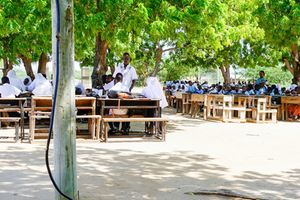Study: Majority of Kenyans adopt virus preventive measures

A boy washes his hands at a point set up at Bangladesh sports grounds. The residents have a strict protocol requiring everyone to wash their hands before they enter or exit the village in Jomvu sub-county.
What you need to know:
- The survey also shows that 94 per cent of Kenyans practise social distancing while 92 per cent avoid handshakes.
- It says 100 per cent of those interviewed have heard of the virus while 90 per cent of remain at home.
Nine out of 10 Kenyans have adopted Covid-19 prevention measures, a new survey by the Ministry of Health reveals.
Data from the Performance Monitoring and Accountability 2020 (PMA2020) shows that 99 per cent of Kenyans have hand washing facilities in their homes while 97 per cent wear face masks.
A total of 5,986 women in West Pokot, Bungoma, Kakamega, Siaya, Nandi, Kericho, Nyamira, Kiambu, Nairobi, Kitui and Kilifi counties were interviewed.
The survey also shows that 94 per cent of Kenyans practise social distancing while 92 per cent avoid handshakes.
The findings were released by Prof Peter Gichangi, the principal investigator for Performance Monitoring Action (PMA) in the country.
It says 100 per cent of those interviewed have heard of the virus while 90 per cent of remain at home.
While the information presents a rosy picture of Kenyans protecting themselves against the virus, it also paints a dire situation of women not accessing vital medical services.
No drugs
Hospitals are either closed or have no drugs. The Covid-19 survey in Kenya shows that women who need family planning or other services from hospitals face difficulties, including the fear of contracting coronavirus.
“Half of the women who want modern family planning services cannot get them,” Prof Gichangi said.
He added that 13 and 11 per cent of women experience difficulties because of restrictions on movement and closure of hospitals respectively.
Some 91 per cent of women say their households have experienced partial or total income loss, with 82 per cent now relying on their husband economically during the pandemic.
The survey recommends the need to sensitise women and communities in general on the availability of services at hospitals as well as safety and prevention measures.
Visiting hospitals
“We need to tell women that there are measures at different hospitals that will ensure they are safe,” Prof Gichangi said.
“It is not true that visiting hospitals will automatically lead to infection.”
The survey’s lead investigator also recommends that programmes to cushion rural and urban households against the ravages of the pandemic should continue being implemented by the government and non-State actors alike.
“Communities are aware of coronavirus infection prevention measures. Messages and communication should now focus on the correct prevention. They should ensure the measures are adhered to and sustained,” he said.





